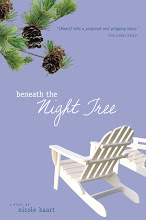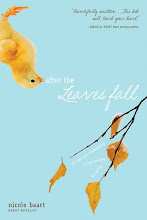One of the most interesting sessions that I went to at the Festival of Faith and Writing was called Taking Risks and Cultivating Compassion Through Fiction Writing. Stephanie Kallos is an actress and author whose second book, Sing Them Home was chosen by Entertainment Weekly as one of the best books of 2009. But her first book is the one that caught my attention...
Some of you may remember that I had title troubles with my third book, The Moment Between. I wanted to call the book Broken for You, but someone had already used that title. Grrr. It's true, I harbored a little bitterness toward this unknown author. But when I met her after her fascinating session at the FFW, I just had to go out and buy her book! Stephanie Kallos has written a masterpiece in Broken for You. And she's a wonderful lady, too. Who knew I'd get to shake the hand of the very woman I resented for "stealing" my perfect title?
Anyway, Ms. Kallos session drew heavily on her acting background to draw out nuance and depth in crafting character. There are several gems I gathered from this presentation. Since they're pretty self-explanatory, I'm just going to list some of her tidbits of wisdom.
- In a character's life, there is no entrance or exit. Therefore, you (as an author) have to choose what to frame and what to leave out of the story. As you write, never forget that the life of your character began before you picked up the story, and will continue long after the last page.
- You must find common ground with your character, even if you don't agree with his or her choices. You cannot stand outside the story and judge them--you have to "walk a mile in their shoes" and learn to empathize with whatever they are going through. Where the commonality stops (between you and your character), you need to start asking yourself, "What if?" This is where writing begins.
- Remember that there is a life-affirming reason for every character you create--even if it is small or hard to identify. If not, why create the character at all?
- Before you can get to know your character (before you can ask that all-important question (What if?), you have to know who you are.
Of course, many of the things that Ms. Kallos said are not new. I've heard all this before... But there was something so fresh in the way she presented it, that I found myself looking at my characters through totally new eyes. I'm excited to apply some of her wisdom to my next book--already I've discovered things about my main character that are stretching me as an author and as a person.
Your Turn: Do any of Ms. Kallos suggestions ring true to you? Is any of her advice new or unexpected? I'd love to hear what you think about her approach to crafting character!











What an awesome activity. I'm totally going to do it! Thanks for sharing, Nicole!
ReplyDeleteAs far as getting to know my characters...I'm not big on filling out lists. I usually start with their backstory. Like where they came from and what they've gone through. Our backstories have such a huge impact on who we are today.
I never really liked filling out forms like that for my characters. I'm not sure why that is. I always tell myself that I learn from then by just writing the story. However, I do think that there is merit in this method, it just takes convincing myself that it will really help. I have several writing books that tell me to do this, but I am a very hard-headed person. My problem is that I can't just sit down and say my character would never do this, or my character's favorite food is peas. Just popping it out of the top of my head doesn't seem like I'm giving justice to my character. I have to feel them out by writing the story; see what they would do that way. I don't know, maybe that's the wrong approach, but it's what works for me.
ReplyDeleteKatie, I'm not very big on lists either. They seem so dry to me. So systematic, when writing (for me) is an act of often random creativity. But I see her point... and I think that at some stage in my story-writing process it would be very valuble for me to sit down and evaluate who my character truly is. I've found before that I wrote a character who contradicted herself. I think I just didn't know her well enough, and an exercise like this would eliminate that problem. Something to think about anyway.
ReplyDeleteLauren, I totally understand where you're coming from. In fact, I was (and still am) very much the same way... Don't tell me what to do! Last year I started writing a book in a very calculated, programmed way. I spent weeks doing character sketches, wrote volumes on setting, and did a traditional plot diagram that I tried to follow to the letter. 50,000 words into the book I HATED it. I couldn't write another word. That sort of formulaic writing killed the entire process for me. But I do see holes in my own writing when I don't have at least some structure... Characters who contradict themselves, timelines that seem variable, subplots that are really nothing but diversions... So I guess I'm trying to maintain my fluid writing style while learning some important lessons about planning and foresight. It's a tough marriage to say the least. Every blessing as you figure it out for yourself! :)
ReplyDeleteI really enjoyed your post and most especially related to what you said in your above comment:
ReplyDelete"I'm trying to maintain my fluid writing style while learning some important lessons about planning and foresight."
That is exactly what I'm trying to do with my new novel.
its like acting; getting into a character's headspace, even into the area of behaviour, action/reaction
ReplyDeleteThanks for stopping by, Paul! Blessings with your writing. :)
ReplyDeleteEe Leen, I think you're right, it is like acting. I did a little acting in high school and college, but it's been a while... Are you an actor?